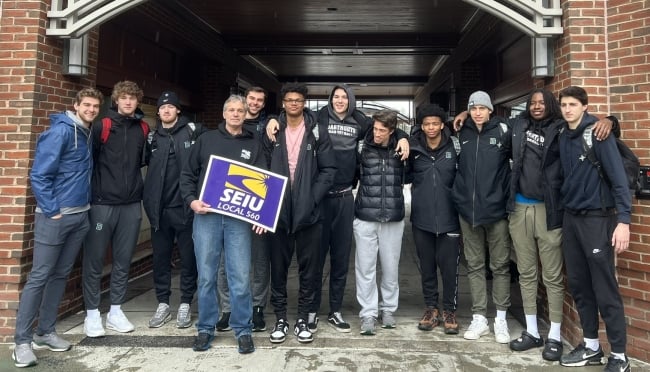You have /5 articles left.
Sign up for a free account or log in.

Members of Dartmouth’s men’s basketball team after a 13-to-2 vote to join a local union.
SEIU 560
Dartmouth College’s men’s basketball team voted 13 to 2 Tuesday to unionize, a potentially significant step in undermining the long-standing amateur model of college athletics. The National Labor Relations Board said in a statement that college officials must now “bargain in good faith” with the union, but Dartmouth officials signaled they were far from ready to concede the matter.
The director of the NLRB’s Northeast regional office, Laura A. Sacks, ruled last month that Dartmouth’s players were employees because “Dartmouth has the right to control the work performed by the men’s varsity basketball team, and because the players perform that work in exchange for compensation.” It made that declaration even though athletes in the Ivy League do not receive athletic scholarships, unlike most other athletes who play in the National Collegiate Athletic Association’s Division I.
The ruling directed the NLRB to hold a secret-ballot election in which the current members of Dartmouth’s basketball team would decide whether to join the Service Employees International Union, Local 560, which represents some other workers at Dartmouth. All but two of Dartmouth’s 15 players voted to join the union.
“Today is a big day for our team,” said a statement attributed to Cade Haskins and Romeo Myrthil, two Dartmouth players. “We stuck together all season and won this election. It is self-evident that we, as students, can also be both campus workers and union members. Dartmouth seems to be stuck in the past … Let’s work together to create a less exploitative business model for college sports. Over the next few months, we will continue to talk to other athletes at Dartmouth and throughout the Ivy League about forming unions and working together to advocate for athletes’ rights and well-being.”
Dartmouth filed motions last week seeking to stay the election or to have the ballots impounded as it asked the regional office to reconsider its ruling. The NLRB rejected Dartmouth’s request to reopen the matter and voted 3 to 1 (after the actual vote occurred Tuesday afternoon) to reject the college’s request to stay the election.
Also on Tuesday, Dartmouth appealed the regional office’s February decision, calling it a “dramatic and far-reaching deviation from well-settled board precedent.” The SEIU 560 union has five days to respond, and the five-member NLRB will consider the dual motions and issue a ruling.
Clarity may not be immediate, though. The board has no timeline for ruling, and such decisions can take months. And its rulings can be challenged to federal appeals courts if either party is unhappy with its outcome.
In its statement about the case Tuesday, Dartmouth officials struck a defiant tone, suggesting they are unlikely to let the matter stand anytime soon.
“For decades, Dartmouth has been proud to build productive relationships with the five unions that are currently part of our campus community,” the college's statement said. “We always negotiate in good faith and have deep respect for our 1,500 union colleagues, including the members of SEIU Local 560.
“In this isolated circumstance, however, the students on the men’s basketball team are not in any way employed by Dartmouth. For Ivy League students who are varsity athletes, academics are of primary importance, and athletic pursuit is part of the educational experience. Classifying these students as employees simply because they play basketball is as unprecedented as it is inaccurate. We, therefore, do not believe unionization is appropriate.”
Last month’s decision came nearly 10 years after another regional office of the labor board declared football players at Northwestern University to be employees. The Northwestern players held a vote on whether to actually join the union, but the ballots never saw the light of day because the full NLRB declined to rule on the matter, citing largely procedural issues and leaving questions about whether college athletes are employees for another day.
Tuesday appeared to be that day.
Mark Conrad, an associate professor of law and ethics at Fordham University’s Gabelli School of Business and director of its sports business concentration, called the Dartmouth players’ vote a “watershed moment in college sports … Unless the full NLRB overturns the vote, we have a new era in labor relations. It is a large nail, maybe the biggest nail, in the notion of college sports amateurism.”
He noted that federal labor laws apply only to private employers, not public universities, where so many major-college athletes are. “But if it can be argued that these students work for the school and an athletic conference (which is private), they could be considered employees of ‘joint employers,’” Conrad said via email.





